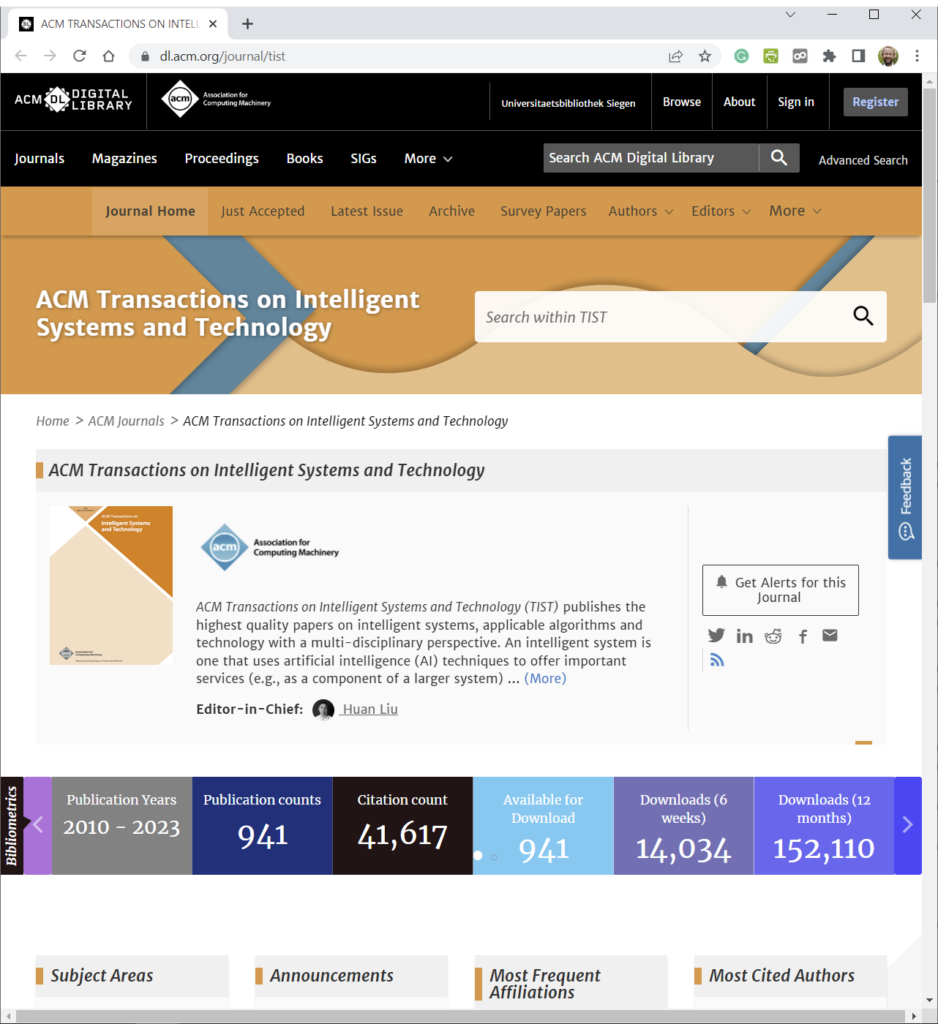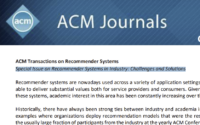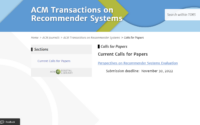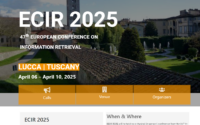CfP: Special Issue on Responsible Recommender Systems (ACM TIST)
We publish the following Call for Papers for the Special Issue on Responsible Recommender Systems with accepted submissions to be published in the ACM Transactions on Intelligent Systems and Technology (ACM TIST) journal. The call will soon also be public on the ACM TIST website.
Call for Papers

Recommender systems are a type of information filtering system that suggests items tailored to individual users or user groups. They represent a powerful machine learning tool to support various human decision-making activities in e-commerce, social networks, entertainment, transportation, healthcare, and cybersecurity. Existing recommender systems typically focus on accuracy and personalization, but increasingly call for an effective means of ensuring the systems are working in a responsible manner. Without appropriate responsible techniques, recommender systems could lead to undesired effects on users, communities, and even society. For example, a recommendation algorithm trained on imbalanced data might be biased toward catering to the preferences of a majority group of users while overlooking minority groups; a system without countermeasures to misinformation may amplify the spread of misinformation, and a recommendation that lacks appropriate disclosure of the decision-making process or intuitive explanations may not be easily trusted by users.
Responsible recommender systems require innovative ways of assessing recommendation contexts, and of processing, communicating and presenting the recommendations. While responsible recommender systems have attracted attention in recent years, the corresponding challenges and threats in technical, social/societal, and ethical contexts are yet to be fully addressed. Furthermore, while existing approaches to the issue mostly focus on a single aspect, such as fairness, explainability, or social trust, a systematic/holistic approach to responsible recommender systems is still in demand. To address the challenges and seize the opportunities posed by responsible recommender systems, the existing methodologies, models, techniques, and applications that need to be reassessed, adapted, or transformed significantly. Besides, emerging techniques for analyzing all types of side information (e.g., multimodal attributes, social information, external knowledge) should be fully explored to advance or expand the scope of state-of-the-art recommendation research in a responsible manner.
This special issue aims at gathering recent advances and novel contributions from academic researchers and industry practitioners in the emerging yet promising field of responsible recommender systems. We call for original and innovative contributions to address the theoretical foundations, modeling and algorithmic issues, and application challenges toward responsible recommender systems.
Scope of the Special Issue
We invite submissions on all topics of Responsible Recommender Systems, including but not limited to
● Algorithmic or user-centric fairness
● Bias and debiasing techniques
● Diversity, novelty, and serendipity
● User awareness and human values
● Cognitive and psychological mechanisms
● Explainability, interpretability and transparency
● Trust in recommender systems
● Misinformation and countermeasures
● Adversaries and defense
● Security and privacy
● Ethics, design, deployment and governance
Timeline
Submission Deadline: June 30, 2023
First Round Revision: September 30, 2023
Deadline for Minor Revision Submissions: October 30, 2023
Deadline for Major Revision Submissions: December 31, 2023
Notification of Final Decision: January 31, 2024
Tentative Publication: early 2024
Guest Editors
Lina Yao, CSIRO’s Data61 and University of New South Wales, Australia
Julian McAuley, University of California, San Diego, USA
Xianzhi Wang, University of Technology Sydney, Australia
Dietmar Jannach, University of Klagenfurt, Austria
Submission Information
Authors can submit their manuscripts via https://dl.acm.org/journal/tist. Submissions to this special issue will follow the regular TIST submission guidelines.



